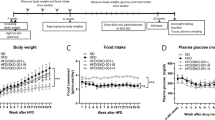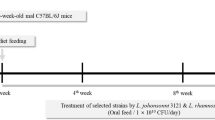Abstract
Intestinal microflora can influence abnormal adipocyte growth. Therefore, this study was aimed to investigate the probiotic properties and antioxidant and antiobesity effects of isolated strains from homemade kimchi. Among the isolated strains, Lactiplantibacillus plantarum KU15120 showed high tolerance to artificial gastric juice and bile salt conditions, high adhesion to HT-29 cells, nonproduction of β-glucuronidase, nonhemolysis, and acceptable resistance to antibiotics. It showed high antioxidant activity, including DPPH and ABTS radical scavenging and antioxidant activity, as determined by the β-carotene bleaching assay. Oil red O staining and intracellular triglyceride levels revealed reduced lipid accumulation, which confirmed the anti-adipogenic activity of L. plantarum KU15120. In addition, the expression levels of fatty acid synthase, CCAAT/enhance-binding protein α, and peroxisome proliferator-activated receptor γ, were significantly lower in the probiotic-treated group than in the control group. These results suggest that L. plantarum KU15120 has probiotic properties, antioxidant, and antiobesity effects and could be used as a therapeutic probiotics.




Similar content being viewed by others
References
Food and Agricultural Organization of the United Nations and World Health Organization (2002) Guidelines for the evaluation of probiotics in food. World Health Organization and Food and Agriculture Organization of the United Nations, London Ontario, Canada
Jang HJ, Lee NK, Paik HD (2019) Probiotic characterization of Lactobacillus brevis KU15153 showing antimicrobial and antioxidant effect isolated from kimchi. Food Sci Biotechnol 28:1521–1528. https://doi.org/10.1007/s10068-019-00576-x
Yu HS, Jang HJ, Lee NK, Paik HD (2019) Evaluation of the probiotic characteristics and prophylactic potential of effects of Weissella cibaria strains isolated from kimchi. LWT - Food Sci Technol 112:108229. https://doi.org/10.1016/j.lwt.2019.05.127
Cheon MJ, Lee NK, Paik HD (2021) Neuroprotective effects of heat-killed Lactobacillus plantarum 200655 isolated from kimchi against oxidative stress. Probiotics Antimicrob Proteins 13:788–795. https://doi.org/10.1016/j.imlet.2011.01.007
Rinninella E, Raoul P, Cintoni M, Franceschi F, Miggiano GAD, Gasbarrini A, Mele MC (2019) What is the healthy gut microbiota composition? A changing ecosystem across age, environment, diet, and diseases. Microorganisms 7:14. https://doi.org/10.3390/microorganisms7010014
Barathikannan K, Chelliah R, Rubab M, Daliri EBM, Elahi F, Kim DH, Agastian P, Oh SY, Oh DH (2019) Gut microbiome modulation based on probiotic application for anti-obesity: a review on efficacy and validation. Microorganisms 7:456. https://doi.org/10.3390/microorganisms7100456
Mehta SK, Gowder SJT (2015) Members of Antioxidant Machinery and Their Functions. In Basic Principles and Clinical Significance of Oxidative Stress. IntechOpen Limited. 5 Princes Gate Court: London, UK
Han KJ, Lee JE, Lee NK, Paik HD (2020) Antioxidant and anti-inflammatory effect of probiotic Lactobacillus plantarum KU15149 derived from Korean homemade diced-radish kimchi. J Microbiol Biotechnol 30:591–598. https://doi.org/10.4014/jmb.2002.02052
Lee NK, Lim SM, Cheon MJ, Paik HD (2021) Physicochemical analysis of yogurt produced by Leuconosotc mesenteroides H40 and its effects on oxidative stress in neuronal cells. Food Sci Anim Resour 41:261–273. https://doi.org/10.5851/kosfa.2020.e97
Lim SM, Lee NK, Paik HD (2020) Potential neuroprotective effects of heat-killed Lactococcus lactis KC24 using SH-SY5Y cells against oxidative stress induced by hydrogen peroxide. Food Sci Biotechnol 29:1735–1740. https://doi.org/10.1007/s10068-020-00830-7
Yang SJ, Lee JE, Lim SM, Kim YJ, Lee NK, Paik HD (2019) Antioxidant and immune-enhancing effects of probiotic Lactobacillus plantarum 200655 isolated from kimchi. Food Sci Biotechnol 28:491–499. https://doi.org/10.1007/s10068-018-0473-3
Lee CS, Park MH, Kim SH (2021) Selection and characterization of probiotic bacteria exhibiting antiadipogenic potential in 3T3-L1 preadipocytes. Probiotics Antimicrob Proteins. https://doi.org/10.1007/s12602-021-09793-5
World Health Organization (2020) Obesity and overweight. https://www.who.int/news-room/fact-sheets/detail/obesity-and-overweight. Available at 2021 Jun 17.
Patel DK, Stanford FC (2018) Safety and tolerability of new-generation anti-obesity medications: a narrative review. Postgrad Med J 130:173–182. https://doi.org/10.1080/00325481.2018.1435129
Yu HS, Kim WJ, Bae WY, Lee NK, Paik HD (2020) Inula britannica inhibits adipogenesis of 3T3-L1 preadipocytes via modulation of mitotic clonal expansion involving ERK 1/2 and Akt signaling pathways. Nutrients 12:3037. https://doi.org/10.3390/nu12103037
Jamous RM, Abu-Zaitoun SY, Akkawi RJ, Ali-Shtayeh MS (2018) Antiobesity and antioxidant potentials of selected Palestinian medicinal plants. Evid Based Complement Alternat Med 2018:8426752. https://doi.org/10.1155/2018/8426752
Lee EJ, Jung SR, Lee SY, Lee NK, Paik HD, Lim SI (2018) Lactobacillus plantarum strain Ln4 attenuates diet-induced obesity, insulin resistance, and changes in hepatic mRNA levels associated with glucose and lipid metabolism. Nutrients 10:643. https://doi.org/10.3390/nu10050643
Park JE, Oh SH, Cha YS (2014) Lactobacillus brevis OPK-3 isolated from kimchi inhibits adipogenesis and exerts anti-inflammation in 3T3-L1 adipocyte. J Sci Food Agric 94:2514–2520. https://doi.org/10.1002/jsfa.6588
Lee NK, Han KJ, Son SH, Eom SJ, Lee SK, Paik HD (2015) Multifunctional effect of probiotic Lactococcus lactis KC24 isolated from kimchi. LWT-Food Sci Technol 64:1036–1041. https://doi.org/10.1016/j.lwt.2015.07.019
Son SH, Jeon HL, Jeon EB, Lee NK, Park YS, Paik HD (2017) Potential probiotic Lactobacillus plantarum Ln4 from kimchi: evaluation of β-galactosidase and antioxidant activities. LWT-Food Sci Technol 85:181–186. https://doi.org/10.1016/j.lwt.2017.07.018
CLSI (2012) Performance standards for antimicrobial susceptibility testing; twenty-second informational supplement. Clinical and Laboratory Standards Institute 32:44–49
Ji K, Jang NY, Kim YT (2015) Isolation of lactic acid bacteria showing antioxidative and probiotic activities from kimchi and infant feces. J Microbiol Biotechnol 25:1568–1577. https://doi.org/10.4014/jmb.1501.01077
Kachouri F, Ksontini H, Kraiem M, Setti K, Mechmeche M (2015) Involvement of antioxidant activity of Lactobacillus plantarum on functional properties of olive phenolic compounds. J Food Sci Technol 52:7924–7933. https://doi.org/10.1007/s13197-015-1912-2
Monteagudo-Mera A, Robert A, Rastall RA, Gibson GR, Charalampopoulos D, Chatzifragkou A (2019) Adhesion mechanisms mediated by probiotics and prebiotics and their potential impact on human health. Appl Microbiol Biotechnol 103:6463–6472. https://doi.org/10.1007/s00253-019-09978-7
Vasiljevic T, Jelen P (2001) Production of β-galactosidase for lactose hydrolysis in milk and dairy products using thermophilic lactic acid bacteria. Innov Food Sci Emerg Technol 2:75–85. https://doi.org/10.1016/S1466-8564(01)00027-3
Dabek M, McCrae SI, Stevens VJ, Duncan SH, Louis P (2008) Distribution of β-glucosidase and β-glucuronidase activity and of β-glucuronidase gene gus in human colonic bacteria. FEMS Microbiol Ecol 66:487–495. https://doi.org/10.1111/j.1574-6941.2008.00520.x
Coppola R, Succi M, Tremonte P, Reale A, Salzano G, Sorrentino E (2005) Antibiotic susceptibility of Lactobacillus rhamnosus strains isolated from Parmigiano Reggiano cheese. Lait 85:193–204. https://doi.org/10.1051/lait:2005007
Álvarez-Cisneros YM, Ponce-Alquicira E (2018) Antibiotic resistance in lactic acid bacteria. In Antimicrobial Resistance: A Global Threat; IntechOpen: Greater London, United Kingdom, pp. 53–73
Jang HJ, Song MW, Lee NK, Paik HD (2018) Antioxidant effects of live and heat-killed probiotic Lactobacillus plantarum Ln1 isolated from kimchi. J Food Sci Technol 55:3174–3180. https://doi.org/10.1007/s13197-018-3245-4
Son SH, Yang SJ, Jeon HL, Yu HS, Lee NK, Park YS, Paik HD (2018) Antioxidant and immunostimulatory effect of potential probiotic Lactobacillus paraplantarum SC61 isolated from Korean traditional food, jangajji. Microb Pathog 125:486–492. https://doi.org/10.1016/j.micpath.2018.10.018
Kim SJ, Choi SI, Jang M, Jeong Y, Kang CH, Kim GH (2020) Anti-adipogenic effect of Lactobacillus fermentum MG4231 and MG4244 through AMPK pathway in 3T3-L1 preadipocytes. Food Sci Biotechnol 29:1541–1551. https://doi.org/10.1007/s10068-020-00819-2
Won SM, Chen S, Park KW, Yoon JH (2020) Isolation of lactic acid bacteria from kimchi and screening of Lactobacillus sakei ADM14 with anti-adipogenic effect and potential probiotic properties. LWT-Food Sci Technol 126:109296. https://doi.org/10.1016/j.lwt.2020.109296
Rosen E, Eguchi J, Xu Z (2009) Transcriptional targets in adipocyte biology. Expert Opin Ther Tar 13:975–986. https://doi.org/10.1517/14728220903039706
Park DY, Ahn YT, Huh CS, Jeon SM, Choi MS (2011) The inhibitory effect of Lactobacillus plantarum KY1032 cell extract on the adipogenesis of 3T3-L1 cells. J Med Food 14:670–675. https://doi.org/10.1089/jmf.2010.1355
Author information
Authors and Affiliations
Contributions
Na-Kyoung Lee: conceptualization, investigation, methodology, validation, writing—review and editing. Kyoung Jun Han: investigation, methodology, writing—original draft, validation. Hoon Park: writing—review and editing, validation. Hyun-Dong Paik: conceptualization, supervision, writing—review and editing, validation.
Corresponding author
Ethics declarations
Conflict of Interest
The authors declare no competing interests.
Data Availability Statement
All data generated or analyzed during this study are included in this article.
Additional information
Publisher's Note
Springer Nature remains neutral with regard to jurisdictional claims in published maps and institutional affiliations.
Rights and permissions
About this article
Cite this article
Lee, NK., Han, K.J., Park, H. et al. Effects of the Probiotic Lactiplantibacillus plantarum KU15120 Derived from Korean Homemade Diced-Radish Kimchi Against Oxidation and Adipogenesis. Probiotics & Antimicro. Prot. 15, 728–737 (2023). https://doi.org/10.1007/s12602-021-09885-2
Accepted:
Published:
Issue Date:
DOI: https://doi.org/10.1007/s12602-021-09885-2




